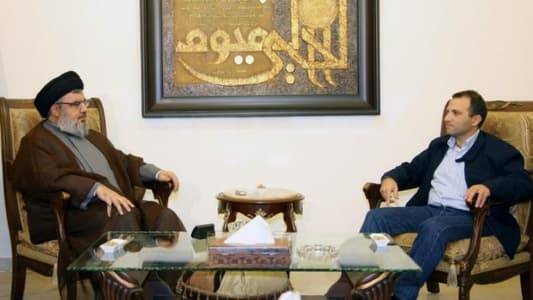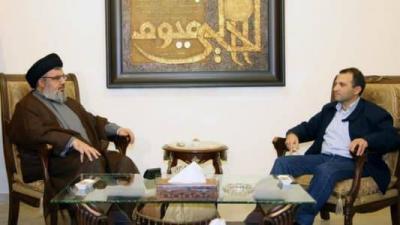Since February 6, 2006, when the then-leader of the Free Patriotic Movement, General Michel Aoun, and the Secretary-General of Hezbollah, Sayyed Hassan Nasrallah, signed the Memorandum of Understanding, the "Mar Mikhael Agreement" has been under scrutiny. Some anticipated it would not last, while others relied on it to regulate relations among Lebanese factions. Over 17 years, the alliance has been shaken and faced numerous challenges but has remained steadfast. Will the current presidential impasse, particularly with Hezbollah's support for former MP Suleiman Franjieh and the backing of a Cabinet session despite the presidential vacancy, deal a heavy blow that leads to the downfall of the agreement?
A source close to Hezbollah declined to comment on this matter, stating: "The issue is being addressed within the bilateral framework between the two parties." In a conversation with "Akhbar Al-Yawm" agency, the source said: "Each party can approach any situation, action, or position from a speculative angle, but the party has been clear in its stance since it proposed the Cabinet session, where it emphasized not ignoring the existing vacancy, not bypassing any position or authority, especially the presidency, and not overriding the constitution or any essential or sectarian components... but also on the basis of respecting all these constraints and considering what can be considered according to the overriding necessities that concern people's interests."
The source stressed that there may be variations in diagnosis, interpretation, and analysis, but the background of the party's position is clear: there is no alignment with any side, no issue with any party, no divergence or messages; rather, it has assessed what it has seen as serving the public interest, necessitated by specific circumstances or permitted by certain interpretations.
The source pointed out that the country's situation is fraught, which should push us to seek ways to consult and reach consensus, thus preventing the country and the people from falling into greater living crises. It called for exploring means that avoid placing matters within a framework of challenge, disruption, or breakdown, while respecting positions and authorities and not infringing upon any of them.
In conclusion, it is expected that what has occurred should accelerate dialogue, consensus, and the conclusion of this vacancy.




